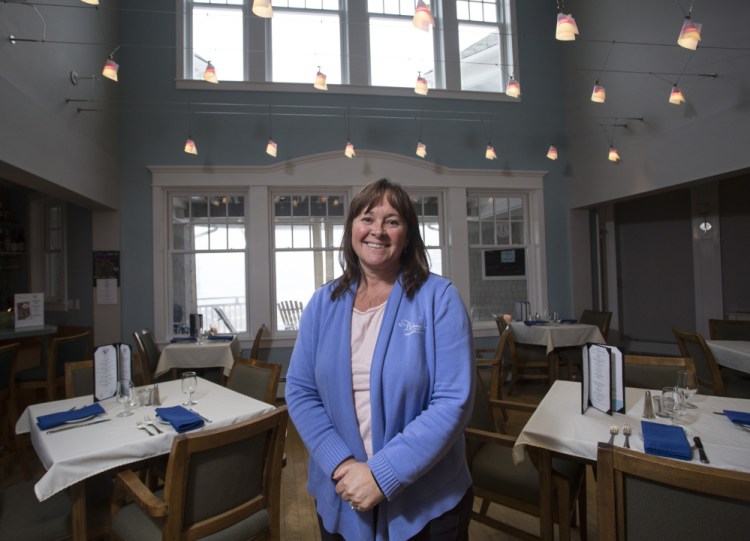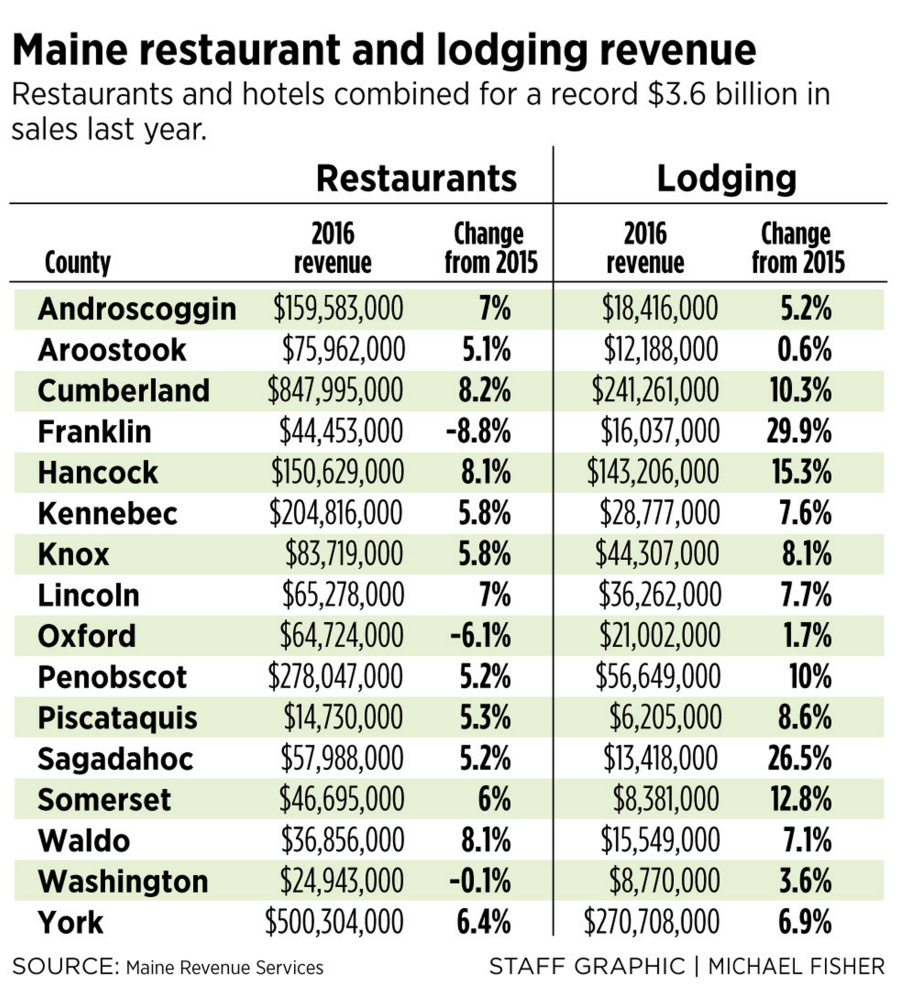Maine restaurants and hotels had a record-breaking year in 2016, bringing in more than $3.6 billion in combined revenue, a 7 percent increase.
The record sales were driven by an improving economy, warm and dry weather, and Maine’s reputation as a place for food, drink and travel.
“My thinking on this is that there are more people who realize Maine can be a year-round destination,” said Steve Hewins, president and CEO of the Maine Innkeepers Association and the Maine Restaurant Association.
Every county in the state had an increase in lodging revenue in 2016, according to data from Maine Revenue Services. Franklin County, which recorded more than $16 million in sales, saw the biggest percentage increase, jumping nearly 30 percent from the year before.
Restaurant revenue rose everywhere except in Franklin, Oxford and Washington counties, the data show. Cumberland County led the way with almost $848 million, nearly a third of all restaurant revenue statewide. Portland, which has developed an international reputation for its food scene, accounted for $357.6 million of the total.
“We jokingly called it a gastronomical high tide and we’re planning for an even greater 2017,” said Jim Britt, principal at gBritt, a South Portland public relations firm specializing in the hospitality industry. Britt also organizes the annual Maine restaurant week in early March.
There seems “no end in sight to national and international media interest in Maine as a place to eat, drink and vacation,” he said.
Restaurant revenue totaled $2.6 billion, an increase of 6 percent, and lodging revenue was $950 million, an increase of almost 10 percent, according to association estimates based on data from Maine Revenue Services. Taxes on restaurant and lodging sales brought in almost $300 million in revenue for the state last year, the associations said.
Low gas prices, consumer confidence and a long, hot summer definitely played a role in boosting visitors and sales last year, as did the millions of visitors to Acadia National Park for its 100th anniversary, Hewins said.
But he also thinks a five-year marketing campaign that the Maine Office of Tourism launched in 2015 is starting to pay off. The marketing effort was aimed at getting first-time visitors to Maine and branding the state as a place to have authentic experiences. The number of visitors to Maine has grown for four straight years, with 35.8 million visitors arriving in 2016, according to the Office of Tourism’s annual report.
Sarah Diment, owner of the Beachmere Inn, a seaside resort in Ogunquit, said she’s met a number of guests in the past few years who were visiting Maine for the first time, a trend she attributes to the state’s advertising effort. Some guests told her they chose Maine because it was an unknown quantity, and they made an initial stop at her hotel before traveling elsewhere in the state.
“It is not the marketing effort we are making in those states,” Diment said. “It has to be the state of Maine marketing effort.”
The hotel had a stronger than usual year in 2016 mostly because of an extended “shoulder” season, she said. Because of the mild winter, guests arrived earlier in the season and stayed later. The hotel gets lots of generational guests and is frequently booked solid during the summer high season.
“The only way we have a really strong season is to have really strong shoulder seasons,” Diment said.
An extended tourism season is boosting business at hotels in the Boothbay region, too. Ramsey Lafayette, a regional manager who oversees three establishments for Lafayette Hotels in Boothbay Harbor, said it is common to have a lot of guests into September and October.
“Where we are seeing the biggest growth is in the shoulder seasons. September has really transformed,” Lafayette said. Key to that trend are 55-and-older guests who have the time and money to spend traveling outside the traditional summer season. Online reservations make it easier for people to schedule an impromptu trip to take advantage of nice weather or go to an event, further boosting lodging sales, Lafayette said.
“My theory here is that we are seeing a reduced booking window,” he said. “People used to book vacations three months in advance, (now) they book them three days in advance.”
Although tourists make up a big segment of lodging and restaurant sales, Mainers are contributing to the trend. About two-thirds of restaurant sales are from in-state residents, said Hewins, president of the restaurant and innkeeper associations. There is a wealth of dining options across the state and it is attracting locals just as much as tourists, he said.
Restaurants employed nearly 62,000 workers, and hotels, inns and resorts employed another 17,000, the associations said. Overall, the hospitality industry employs about 12 percent of the state’s workforce.
“We know the restaurant business is driven by in-state travel,” Hewin said. “It’s not just Portland, there are a lot of restaurants that are bringing people to small urban places.
“It is just a big part of our economy, probably more so than in other states.”
Peter McGuire can be contacted at 791-6325 or at:
Copy the Story LinkSend questions/comments to the editors.





Success. Please wait for the page to reload. If the page does not reload within 5 seconds, please refresh the page.
Enter your email and password to access comments.
Hi, to comment on stories you must . This profile is in addition to your subscription and website login.
Already have a commenting profile? .
Invalid username/password.
Please check your email to confirm and complete your registration.
Only subscribers are eligible to post comments. Please subscribe or login first for digital access. Here’s why.
Use the form below to reset your password. When you've submitted your account email, we will send an email with a reset code.